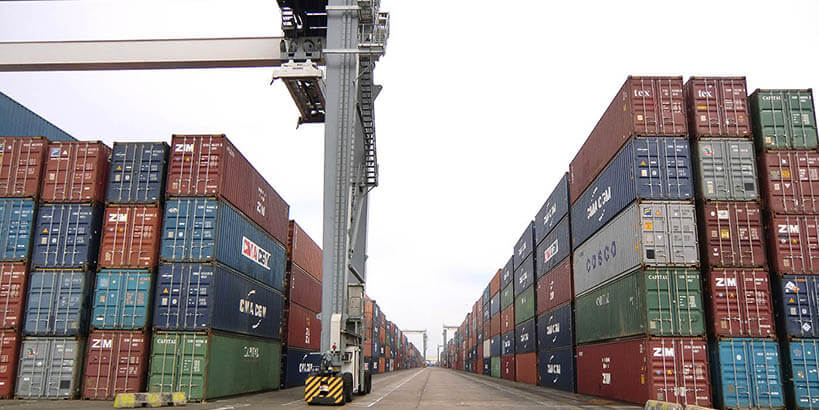*Exporters, agents lament unfair treatment
One of the key aims of the Muhammadu Buhari administration is to make Nigeria an industrial hub through boosting Nigeria’s production capacity.
Advertisement
This informed the introduction of several trade reforms to boost the country’s export capacity.
Interestingly, some of the reforms were gathered to have been necessitated mainly by the Economic Recovery and Growth Plan (ERGP), and the National Industrial Revolution Plan (NIRP).
Though the country is yet to meet its desired target on exportation of non-oil products, appreciable gains are being made, especially on exportation of some locally made products.
However, investigation reveals that the extent to which the country would achieve this target is now uncertain as a result of many factors one of which is the activities of some terminal operators.
Advertisement
It was gathered that a certain terminal operator at the Tincan Island Port, TICT, has put in place policies that frustrate and discourage local manufactures.
Specifically, most importers and licensed agents told THE WHISTLER that unlike others, the foreign firm rejects exports for unjustifiable reasons.
It was said that the company does that on the excuse that the exports were beyond the capacity their vessel could carry. However, they added that the rejected exports are usually accepted by other terminal operators.
A top licensed agent, who pleaded anonymity painted the picture of the situation thus: “The cause of this traffic we are seeing now is partly as a result of the exports that the terminal rejects. If containers come loaded with exports, they are often rejected by the terminal. The thing is even affecting empty containers, because the export will come as they cross this place, the Nigerian Ports Authority ,NPA, will allow the containers to go, the customs at the gate will also allow them to go so far their documents are in order. But when they are inside the port, the TICT will now make it difficult for us by saying that the containers should go back. And this same container
that they rejected, would go to the Apapa Port and be accepted. When they get to Apapa, the same vessel that they said could not carry the rejected container containers at Tincan, would still come and carry the containers. In other words, they are frustrating exportation in Tincan. What they are doing is killing the economy.”
Also speaking, an importer, who spoke on the condition of anonymity said: “I don’t really understand why they are doing this. We have also called to advice in our own little ways. We told them that if there is a particular figure, assuming the capacity of their vessel is 50,000 Metric Tons, and they are expecting to carry 200 containers to meet up with that capacity and at the end of the day, they can carry 150 containers instead of rejecting them.
Advertisement
“if you complain of the overweight, you can carry One fifty, to make sure it doesn’t exceed 50,000 metric tons . It is very clear that it is not caused by NPA, neither is it caused by customs. As things are now, if our cargo is coming to this port, we are always scared because they will make us to incure extra expenses beyond our budget. The firm is always saying that once your cargo is one unit above 30, it would not be accepted. These things are constructed by human beings like us, the same machine that is saying 30.0 here, if you go to Apapa, it will be 27. I have a copy here of a container that weighed 30.4 in Tincan, but weighed 27 metric tons in Apapa.’’
Lending his voice, another agent, said: “It just started recently. Things had been going on well before now. The challenge we used to have then was that terminals were filled up, but, drivers understood the situation. One of the officials of the company was telling us that they are following Maritime Law, adding that they would not go against it. But, if they are talking about Maritime Law, every other port should also adopt the system. The most annoying part is that vessels from other ports will still come here and carry containers. It is so bad that clients will be thinking we don’t know what we are doing.’’
Asked if a formal complaint had been made to appropriate authorities, the stakeholder said: “I believe before you go on air, you must have discussed with those involved. When we discussed with them, they told us that they would see what they can do about it. We even suggested to them to make provision for excess charges.
“We have maritime laws, and the government can also look into into this issue. Also, the NPA, Shippers Council and other relevant agencies should consider our plight. What is happening is affecting the revenue of the government, because what is meant to come here, is not coming in.”
Counting the cost of the situation, an importer, said: “The cost is unquantifiable. It affects our budget and makes us to lose clients. In other words, the supply chain is affected. It is even one of the causes of the Apapa traffic because they ask containers to go back and some of them end up staying on the roads. Now, clients would ask you to sign a letter of undertaken stating that you would pay the cost of taking a container to Apapa if it is rejected at Tincan.’’
Efforts to get the reaction of the management of TICT proved abortive.
Advertisement
When contacted, Mr. Emmanuel Akporherhe , the Port Manager, said he could not respond to the allegation against TICT.
“I am not on ground and cannot say anything on it” he stated, adding that the reporter should find out from officials on ground.
Helen Agboghano, the Public Relations Officer of the Nigerian Shippers Council also declined comment, saying her office was in Abuja and couldn’t comment on the issue



